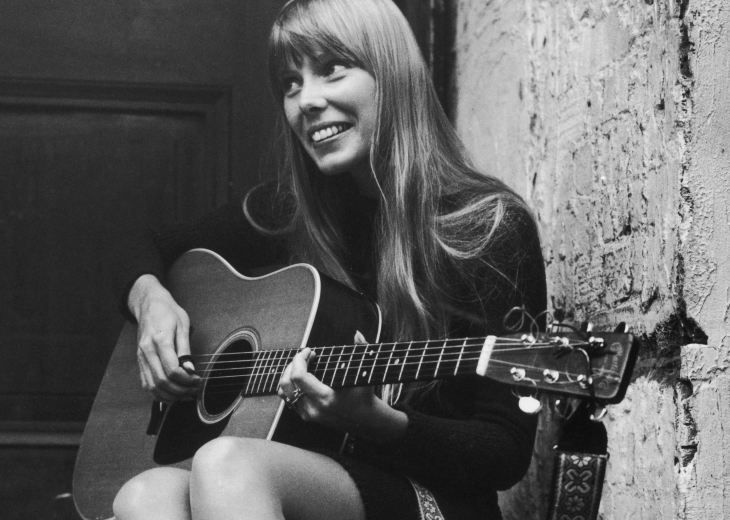
Buying an unheard LP was a risk in the pre-Spotify age. A dud left you with gambler's despair. The reward for striking gold, however, was a who-dared-won joy rarely tasted by young musical explorers nowadays, I suspect. The day after my last A-level in 1987 I bought a cassette of Joni Mitchell's Blue at a long-vanished record shop in Great Malvern chiefly because a girl I liked had mentioned it. Putting the cassette into my Walkman rip-off and hoping for the best, I set off home along the hills.
Good God. The next 35 minutes transformed my understanding of what songs could do and what singers could be. First, Joni Mitchell's voice is made of contradictions: it warbles with vibrato but is astringent and harsh, too; it's acrobatic yet grounded; vulnerable yet indestructible; mannered and octave-straddling, yet also as natural as breathing or speech.
Secondly, the instrumentation. The five-a-side of songs on Blue are stripped back to a guitar with atypical tunings; an Appalachian dulcimer drone (me neither); a lick of percussion or slide guitar; and a piano. That's your lot. The lack of clutter makes space both for the voice to bloom and for my "thirdly": the album's consummate lyrics.
Reflecting the 28-year-old songwriter's romantic liaisons, many lines describe the joy and pain of love: "Oh you're in my blood like holy wine/You taste so bitter and so sweet/Oh I could drink a case of you, darling/And I would still be on my feet." The ennui of success and excess is well represented: "Well there's so many sinking now/You've got to keep thinking/You can make it through these waves/Acid, booze, and ass/Needles, guns, and grass/Lots of laughs, lots of laughs." Elsewhere, rhymes seem to occur just for the hell of it: "Richard got married to a figure skater/And he bought her a dishwasher and coffee percolator."
The songs on Blue are pages torn from a raw autobiography. The ache in the song "Little Green" is palpable without knowing that the girl in the song is the daughter that Mitchell, as a young single mother, gave up for adoption: though the ache is trebled by knowing. This naked honesty in music was new to me until I heard Blue (and to Kris Kristofferson, whose response to the album was reportedly, "Joni! Keep something of yourself!"). The notion that, in art, nakedness is armour was new to me until I heard Blue. Truthful songs of female experience and female agency were, likewise, new to me until I heard Blue. (Kate Bush a sole exception.) Time and the changing world have not been kind to many albums that were important to me as a kid, but Blue is art, so Blue is ageless.
Copyright protected material on this website is used in accordance with 'Fair Use', for the purpose of study, review or critical analysis, and will be removed at the request of the copyright owner(s). Please read Notice and Procedure for Making Claims of Copyright Infringement.
Added to Library on December 21, 2017. (8689)
Comments:
Log in to make a comment
BeauJangles on :
Yes, Blue like all of Joni's LPs were finely crafted. Co-joining with James Taylor, added to this masterpiece. I used to come home from school everyday, eagerly awaiting to listen to her famous folk oriented four. Too bad you didn't pick up Blue on vinyl. Cassettes were rather poor quality until the mid 80s. CDs maybe the spirit of the music industry, but vinyl will always be the heart and soul of it. For the record David, (no pun intended) the 'slide' that you're hearing, was the late great Sneaky Pete, on pedal steel guitar. God rest his soul. Also, the comment about Joni's so-called "warbling voice", and "a-side" being stripped back? May you be enlightened, she had an incredible vocal range during these earlier years. Each and every one of the songs on Blue were intended exactly as meant. Some 50+ alternate tunings have been utilized on the guitar, by the way. It's comin' on Christmas, everybody. Bless you, Joni.